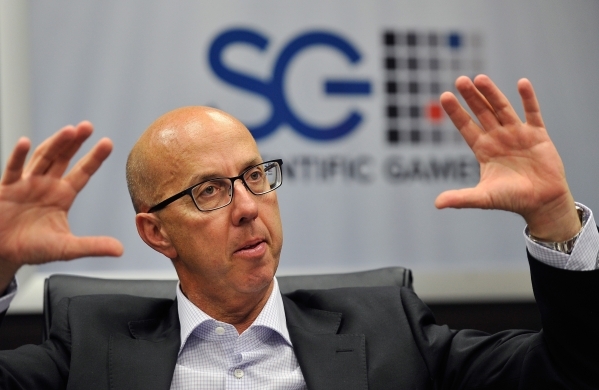Pieces falling into place for Isaacs, Scientific Games


A year ago, Gavin Isaacs was the dog who actually caught the car he’d been chasing.
Scientific Games Corp. spent almost $8 billion in corporate acquisitions to create a gaming equipment provider and manufacturer with 10 divisions touching all aspects of the legalized gambling industry.
It was Isaac’s job to make all the pieces fit.
The company’s board gave its CEO a vote of confidence this month.
Isaacs’ management agreement was extended by one year to June 2018, according to a securities filing that credited him with achieving “key business objectives, including integration milestones” in bringing the former WMS, Bally and SHFL companies under one corporate roof.
The financial terms of the employment agreement were unchanged. According to a June 2014 Securities and Exchange Commission filing, Isaacs is paid $1.5 million a year in salary and can earn as much as 100 percent and 200 percent of his salary in bonuses for reaching performance goals.
Several analysts said Isaacs, 50, is worth every penny.
Deutsche Bank gaming analyst Andrew Zarnett said the contract extension “provides indirect confirmation that the synergies and integration initiatives are being implemented according to plan.”
Scientific Games also amended the contract of Executive Vice Chairman Richard Haddrill — Bally’s former CEO — for additional duties beyond his board responsibilities. He is expected to oversee “special projects” assigned to him by Isaacs and the board covering “key account endeavors” and other operational projects.
“Given Haddrill’s relationships with many top-tier customers, we view this as a positive add,” Zarnett said.
It’s been a busy month for Scientific Games, and we’re just halfway through November.
The Las Vegas-based company signed an agreement with the Alberta Gaming and Liquor Commission on Nov. 2 to provide a management system for the Canadian province’s 28 casinos. The system, which will displace a system provided by rival International Game Technology, will connect to more than 14,000 slot machines.
Eilers Research founder Todd Eilers said contract was “a sizable win” for Scientific Games “and should provide further growth over the next two or three years.”
With the company picking up the benefits of contracts through its Bally acquisition covering the lotteries in Ontario and British Columbia, Scientific Games’ system division is the king of Canada.
Three days after the Alberta deal, Scientific Games was given a five-year contract by the Arizona Lottery to manage the state’s gaming system, which generated more than $750 million in retail sales in the past fiscal year. Scientific Games, which will replace a system operated by GTECH, had been providing instant lottery tickets to Arizona since 1981.
Sterne Age CRT gaming analyst David Bain said Scientific Games won the Arizona contract “on technology and synergy capabilities and the ability to provide deeper analysis for market lottery growth as the full lottery provider, rather than just the instant tickets provider.”
Scientific Games did not offer a value for either contract, but the Arizona contract could be worth between $8 million and $9 million in annual fees, analysts said.
Eilers said 2016 could be a pivotal year for Scientific Games with lottery systems contracts expiring in four states and Puerto Rico. The company is expected to rebid on its current deals in Maryland and Puerto Rico while trying to displace competitors in Florida, West Virginia and Montana.
Bain told investors the “two fairly significant pipeline contracts” in Alberta and Arizona “demonstrate portfolio diversification strength for Scientific Games.”
The company reported third-quarter results last week, but Wall Street has focused more the expected $200 million in annual cost savings the company hoped to obtain following the $5.1 billion acquisition of Bally, which was completed a year ago. Also, several analysts expressed concern about the company’s $8.5 billion of long-term debt.
In an interview before last month’s Global Gaming Expo in Las Vegas, Isaacs said the debt was part of the company’s initial expansion strategy and was manageable.
“We have enough comfort in our earnings and cash flow to pay down the debt,” Isaacs told the Review-Journal. “We always look for ways to generate more cash flow.”
Zarnett said investors should view the extension of Isaacs’ contract as a sign that Scientific Games has the ability to handle and service what some consider a large debt for a gaming equipment manufacturer.
“We are cognizant of the high leverage, the challenged short-term fundamentals, and the ongoing risk around the execution of the synergies plan,” Zarnett said. “We continue to believe that ultimately the integration will be successful.”
— Howard Stutz’s Inside Gaming column appears Wednesdays and Sundays. He can be reached at hstutz@reviewjournal.com or 702-477-3871. Find on Twitter: @howardstutz












